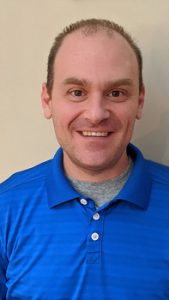Michael Bressler is a dual degree master’s degree student within social work and public health. He plans to graduate at the end of this semester “with two master’s degrees and a world full of opportunities.” After serving for four years in the U.S. Marine Corps and deploying to Iraq in support of Operation Iraqi Freedom, he pursued and received his bachelor’s degree in psychology from The Pennsylvania State University. He then worked for two Veterans Affairs Medical Centers for a total of five years before beginning his graduate studies at UNC-Chapel Hill.

What made you choose UNC-Chapel Hill when deciding on a program/place to study?
When I joined the U.S. Marine Corps in 2002, I knew I wanted to go to college and I only had two schools on my mind: Penn State and UNC. I deployed to Iraq in support of Operation Iraqi Freedom in 2005 and discharged in 2006. Upon discharge, I moved back to Pennsylvania, where I grew up because I was accepted to Penn State and wanted to pursue a degree in psychology. After working for the VA Medical Centers in both Washington, D.C., and Durham for many years, I decided to pursue a graduate degree in hopes of becoming a licensed clinical social worker. The choice in schools was easy. First, it was always a dream of mine to go to UNC and, second, the reputation of the School of Social Work is excellent and I have never been one to settle for second best. Succeeding my decision to pursue a graduate degree in social work, I learned about the dual degree program in public health. Since UNC has the number one public school of public health in the nation, the choice was clear. After years of hard work, I will finally be graduating this semester with two master’s degrees and a world full of opportunities.
Tell us about your research.
I am currently working on a project in partnership with UNC and the U.S. Department of Veterans Affairs conducting a gap analysis and needs assessment for veterans and their families in the Durham catchment area. However, long-term, I would like to conduct research around military discharge. More specifically, I would like to work in partnership with the military, the VA, community partners, and academic institutions to teach skills, build community capacity and provide resources for individuals who are being discharged from the military.
When I discharged from the Marine Corps in 2006, I was completely unprepared for what I would face in civilian society. Although I knew a lot about how to coordinate and utilize different fire support mechanisms and entities to help support the infantry, those skills didn’t translate well to civilian society. Additionally, I never had to pay my own rent and I lacked simple skills such as cooking and budgeting, which I needed to learn quickly and effectively if I were to survive. Furthermore, I carried a great degree of stigma and felt isolated and alone. I didn’t know who to reach out to for help when I needed it and didn’t understand how much to share with my family and friends. Thus, working in this sector is something that I am very passionate about and I would love to continue to research the topic and partner with other organizations and communities to close the gap between military service and veteran status.
What is an important lesson that you learned in the military that has helped you in graduate school?
By far, the most important lesson I learned while I was in the Marine Corps that has translated to graduate school is time management. The Marines have a saying: “Early is on time and on time is late” and we would always need to muster 15 minutes prior to a scheduled time. This ensured that we were always in a state of readiness. Graduate school is a series of different due dates. The assignments are posted, the instructions are there and the due dates are available at the beginning of the semester. If I could give one piece of advice to any military-affiliated grad student, it would be to learn to adapt the skills that you learned while you were in the military to grad school. These skills might not translate perfectly, but you can usually find a way to adapt something to match a different skill set. Like boot camp, graduation is right around the corner and you will be amazed at how quickly the time moves.
What are you hoping to accomplish with your Carolina degree?
I’m hoping that with my degrees I will have a wide variety of options. Being a combat veteran, and having an undergraduate degree, and pursuing two master’s degrees in social work and public health has allowed me to think about individual health and population health in a variety of different ways and on numerous levels. I intend on working in a career that allows me to make beneficial changes at the systems level. Wherever I land, I hope to have the ability to collaborate with multiple organizations and problem-solve large issues so that I can have a vast and positive impact on people’s lives. After all, that’s what matters to me: changing people’s lives for the better.
